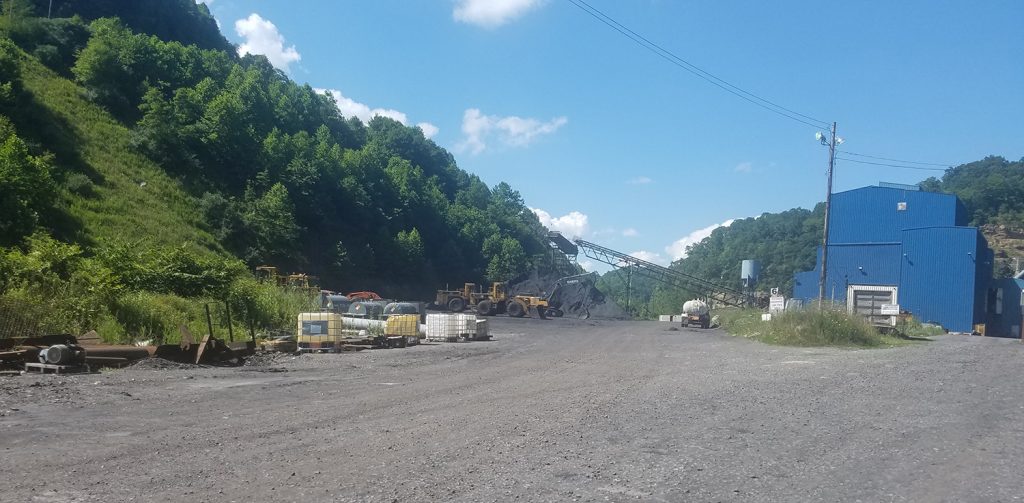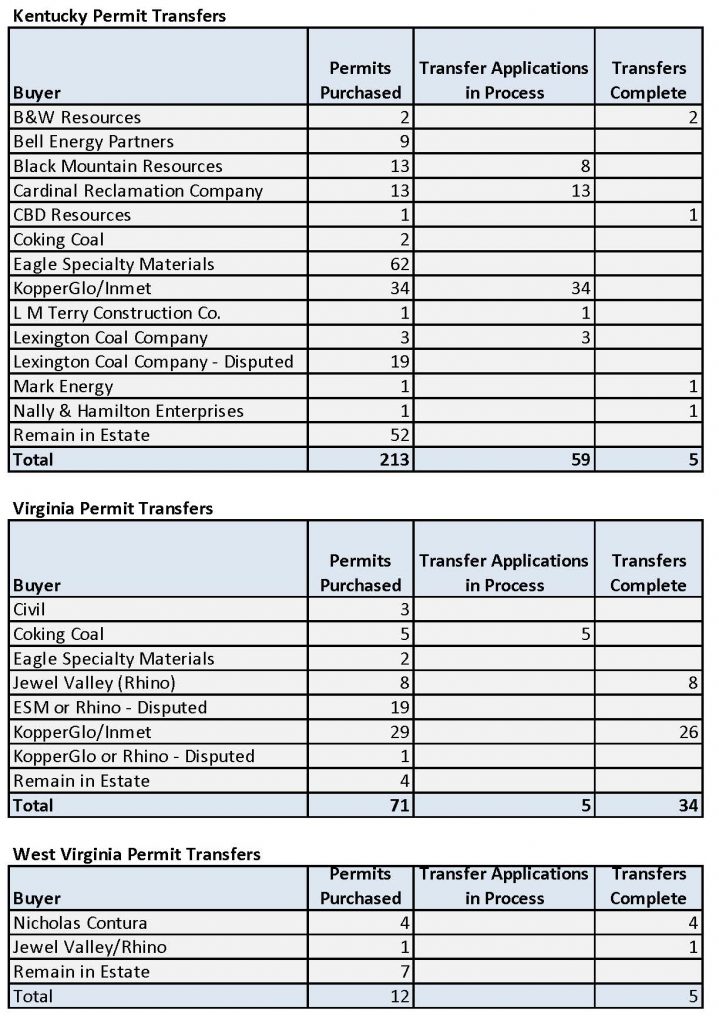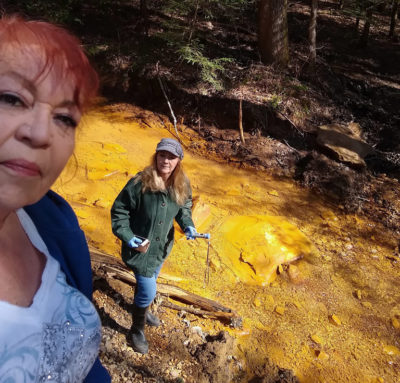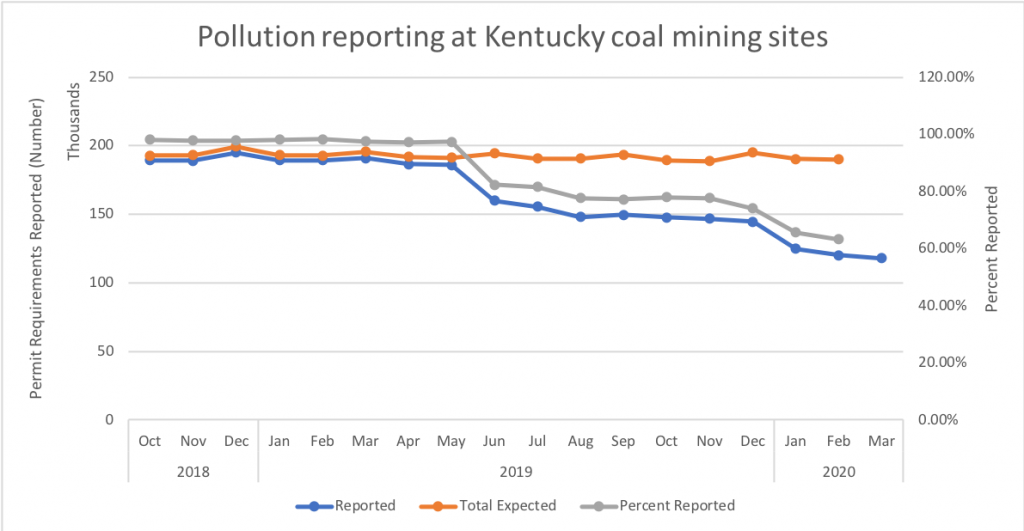Front Porch Blog
It’s been over nine months since Blackjewel and its affiliate Revelation Energy filed for bankruptcy, and the case is wrapping up. Bankruptcies are often very chaotic, with many sides competing for the scarce remaining resources of the company and creating much confusion along the way. This is no exception.
Since April, interesting developments in the Blackjewel bankruptcy case illustrate the company’s shaky situation and are raising doubts about whether the serious reclamation problems at many of its sites will be properly addressed anytime soon.

The permit for this former Blackjewel coal operation is now held by Jewell Valley Mining LLC, a subsidiary of Rhino Energy LLC. Photo by Matt Hepler
Is Blackjewel liquidation next?
Blackjewel made a motion on April 24 to extend the time by which it can file for a Chapter 11 bankruptcy plan by an additional 90 days. This is the third such extension that Blackjewel has requested since declaring bankruptcy more than 10 months ago. Hours later, the official committee of creditors filed a motion for moving the bankruptcy into Chapter 7.
Chapter 11 bankruptcy involves a reorganization of assets through a plan approved by the court. Generally, the company filing bankruptcy is given a period of time to file a proposal, after which creditors may file alternate plans. Blackjewel has still not filed such a plan and is requesting additional time to do so. Chapter 7 bankruptcy generally involves the liquidation of assets by a trustee, with proceeds used to pay creditors.
In this case, the creditors argue that Blackjewel has already sold off most of its assets and has negative cash flow as of its March operating report. Creditors further argue that Blackjewel has no intention of rehabilitating its operations, having already sold most of its mines, so the company should not qualify for Chapter 11 protection.
Both creditors and debtors plan to further investigate former Blackjewel CEO Jeffery Hoops’ financial dealings before the company declared bankruptcy. On April 29, a U.S. magistrate judge approved a motion to allow for discovery of financial records of United Bank, Jeffery Hoops, his immediate relatives, and several Hoops companies collectively being referred to in the court docket as the “Hoops-Related Entities” or “Hoops Parties.” Blackjewel’s attorneys and the unsecured creditors have asserted that Jeffery Hoops had seriously mismanaged the company’s finances before the bankruptcy. The attorney for Hoops and the Hoops-related entities had previously argued that the discovery request was overly broad and burdensome.
An uncertain outlook for reclamation
Appalachian Voices has been following this bankruptcy since it began, as we had already been monitoring ongoing pollution issues at several of the companies’ mines. Back in January, Appalachian Voices, along with Powder River Basin Resource Council, Kanawha Forest Coalition, Kentuckians For The Commonwealth, Citizens Coal Council, Appalachian Citizens’ Law Center, Kentucky Resources Council and the Sierra Club, sent a letter to the bankruptcy court citing concerns over reclamation obligations and other violations across multiple states. Blackjewel responded to the letter, and Kentucky Energy and Environment Cabinet subsequently responded to Blackjewel. Following a hearing on January 22, the court ordered monthly reports outlining progress on the transfers of permits.
Subsequent filings have allowed Appalachian Voices to get a better handle on which permits have sold. The map below outlines the sale of the Blackjewel estate according to court filings listed in the caption.
Map: Colors indicate different former Blackjewel and Revelation mine permits that have been sold. Kentucky and Virginia contents displayed in this map are the result of these filings: Docket 1, Docket 2, Docket 3. Note that bankruptcy court is always evolving and the information in this map could be subject to change or become outdated, and is a portrayal of the Blackjewel bankruptcy as reported by Blackjewel. West Virginia data is from the WVDEP and shows permit transfers and does not originate in the bankruptcy docket. At Appalachian Voices, we will do our best to track the permit sales and keep the map above updated as often as we can. Data referenced in the map will be cited with bankruptcy filings associated with the data. Still, bankruptcies can be very dynamic and often problems can arise both with permit sales and permit transfers. This map is intended to provide a clearer picture of what has been sold and to whom.
As can be seen in the map, a number of permits have been sold to various other entities. It is noteworthy that there are more than 60 permits that have not sold and are remaining in the estate as of April 15 It is unclear what will happen to these remaining estate permits if Blackjewel liquidates its remaining assets and, if it does, whether its bonding company will be on the hook for reclamation. Also noteworthy is a transfer to the Lexington Coal Company, which also has ties to the coal baron Jeffery Hoops as his son is listed as the president of the company.
However, according to the Kentucky Energy and Environment Cabinet, most of the purchasers of Blackjewel’s former mines have not applied for permit transfers, which means the reclamation obligations associated with those permits are still tied up with Blackjewel until the permits are officially transferred to the other companies. As of this time only five permits have been officially transferred from Blackjewel to other companies in the Kentucky Surface Mine Information System.
Blackjewel permit transfers

Kentucky Data compiled by Dan Firth of Appalachian Citizens Law Center using the Kentucky Surface Mine Information System. Virginia and West Virginia data compiled by Appalachian Voices using data from West Virginia Department of Environmental Protection and Virginia Department of Mine Minerals and Energy data
Eagle Specialty Materials, a subsidiary of FM Coal, bought over 70 permits in Kentucky and potentially as many as 22 permits in Virginia. Lexon Insurance Company, the surety that provides reclamation bonds for many of the permits in this bankruptcy, required Eagle Special Materials to take ownership of and reclaim all of these permits as a condition to acquire the Belle Ayre and Eagle Butte mines in Wyoming.
If Blackjewel moves to liquidation, it will likely abandon a number of permits. Since Lexon provides the reclamation bond for many of those permits, it would be responsible for the cost of reclamation at those permits. Most of these permits are high-cost, low-production-value mines that were acquired by Blackjewel from previous companies’ bankruptcies.
One of the Eagle Specialty Materials permits in the East is the Greenwood permit in McCreary County, Ky., a coal processing site that has bad acid mine drainage problems and was issued cessation orders on July 29, 2019 for discharging substandard water into the Daniel Boone National Forest. The site is supposed to continuously pump water in a closed-loop system so that the polluted water never leaves the site, but following the bankruptcy, the pumps had been turned off for a time causing notable pollution problems.
In April 2020, local citizen Joanne Hill spoke with the mine inspectors and reported that the pumps had been turned back on, thus providing a temporary solution. Still, pumping the water only prevents violations and is not a long-term water treatment strategy. The cost of treating the polluted water at this site will be high, and this is just one mine permit.

Joanne Golden Hill and Teri Blanton monitor water quality at Copperas Fork in Daniel Boone National Forest, where acid mine drainage is coming from a site owned by bankrupt Revelation Energy. Photo by Joanne Hill
The water quality violations associated with the Greenwood permit are documented largely thanks to the diligent volunteer monitoring of Joanne Hill and Teri Blanton, both long-time environmental advocates and community leaders, brought up in Kentucky coal mining families. Without a Joanne or a Teri monitoring every mine in the region, the public and regulators alike must depend on Discharge Monitoring Reports furnished to the states by the coal company itself to learn of pollutants entering public waterways.
After filing for bankruptcy, Blackjewel seems to have just stopped reporting this data to a large degree, at least in Kentucky, according to data compiled by the Appalachian Citizens Law Center. This resulted in a sharp spike in administrative violations issued against the company, and has created a huge gap in any documentation of the actual effects of effluents discharging into public waters from Blackjewel operations.

Coal companies are required to self-report their discharges of pollution to surface waters. This chart shows the number of monitoring requirements for which mine permits reported data to the Kentucky Pollutant Discharge Elimination System from October 2018 through March 2020 (blue), the percentage of the expected monitoring requirements reported for mine permits reporting their pollution data (gray) and the expected number of reports (orange). Reporting dropped sharply from May to June 2019, and 73% of that decline was due to the Blackjewel and Revelation Energy bankruptcy. Since then, reporting has continued to decline. This data includes bituminous and lignite surface coal mines and bituminous underground coal mines. Data analysis and chart by Dan Firth/Appalachian Citizens Law Center.
It’s not clear whether Eagle Specialty Materials is prepared to handle these significant reclamation obligations. In bankruptcy court, ESM is undergoing a prolonged argument with the equipment company Komatsu over the use of two industrial shovels. ESM claims it would not be able to operate without the shovels, which casts further doubt on its future ability to do mining and reclamation. Komatsu is seeking the court’s permission to repossess the shovels from Eagle Specialty, hampering their ability to do any more coal mining and raising concerns about ESM’s ability to operate going forward.
Numerous questions are still unanswered with the bankruptcy. What will become of the numerous remaining permits if the Blackjewel estate is totally liquidated? Will the permit transfers ever go through so that the reclamation liability is transferred to the new operators? And will the new owners have both ability and willingness to reclaim the mines they purchased?
There are still numerous unknowns nine months into this bankruptcy. Appalachian Voices will continue to watchdog this evolving situation with the goal of making sure that these mine permits are reclaimed and that coal companies are held accountable.
PREVIOUS
NEXT

Leave a comment
Your email address will not be published. Required fields are marked *

Leave a Comment